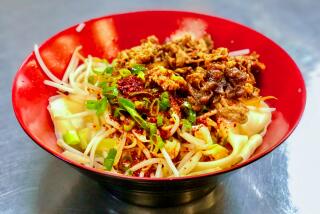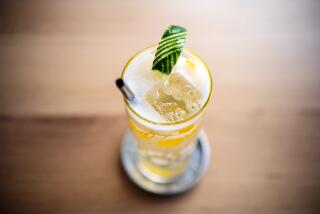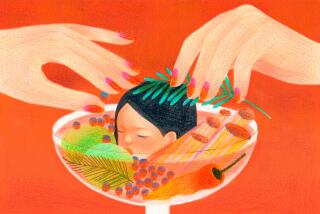Spirited Traveller: Imbibing baijiu in Beijing
- Share via
NEW YORK (Reuters Life!) - “Visiting Beijing five or even three years ago, you’d have been hard-pressed to find a decent cocktail outside the high-end hotel bars,” says Paul Mathew, a drinks consultant who has resided in Beijing for more than two years.
“These days Beijing’s bar scene is developing as fast as the rest of the country, with international standard whisky bars, classic cocktail speakeasies and even the odd craft brewer.”
Which is not to say that tradition is completely gone; it’s merely evolved a bit. Visitors doing business with local Chinese firms should be prepared for “traditional generosity,” which may include dinners with Chinese hosts involving copious toasts with baijiu, a rice-based clear spirit often consumed as a shot.
However, Mathew observes that the baijiu-soaked banquet is “becoming less common for business deals - unless government officials are involved.” Meanwhile, Western-style dinners with wine and beer, possibly followed by whisky or Cognac, are taking their place. But the frequent toasts remain a fixture of the event.
The merriment may continue after dinner with an invitation to karaoke. “Western participants are not required to attend,” Mathew advises. But those that join in should expect the whisky and brandy to flow. They should also brace themselves for lots of whisky (usually Scotch) and iced green tea, China’s most popular mixed drink.
Drinking establishments abound, but the best can be hard to find. For example, Q-Bar (https://www.qbarbeijing.com/), a popular roof terrace bar, is on the top floor of a cheap hotel; Twilight (https://twilightcocktailbar.com/), another top after-work spot, is hidden above a Starbucks and a Chinese restaurant.
“But they are well-worth seeking out to get more of a feel for the city’s emerging drinks culture,” Mathew adds.
A few more of Mathew’s recommendations:
For business deals, Atmosphere (https://www.shangri-la.com/en/property/beijing/chinaworldsummitwing/dining/restaurant /atmosphere), inside the Shangri-La Hotel, or the Bar & Lounge at Maison Boulud (https://www.danielnyc.com/maisonboulud.html).
To impress clients, Long March Bar (https://www.chinaclub.com.sg/facilities_longmarch.html) at the China Club is a top pick, as membership is required. The space originally was a waiting room for noblemen going to the palace. More accessible choices include the Champagne Bar (https://www.fairmont.com/beijing/GuestServices/Restaurants/Cha mpagneBar.htm) at the Fairmont, Lounge at Lan Club (https://www.lan-global.com/beijing/chinese/home.htm), or Xiu’s rooftop terrace (https://xiubeijing.com).
For a taste of Beijing, try Red Capital Club (https://www.redcapitalclub.com.cn/RedCapitalClub.html),a converted bunker in a hotel that specialises in “Communist-era chic.”
As elsewhere in Beijing, a mix of old and new continues to capture the imagination. Tradition isn’t gone, but it certainly has evolved.
RECIPE
The ShuiJingFang Grapefruit Sour courtesy of Paul Mathew
This is an original recipe from Paul Mathew featuring baijiu, giving this old-school spirit a fresh face. The spirit’s mix of sweetness, citrus and funky, fermented notes can be “quite a challenge for mixed drinks, but one that bartenders in China are starting to embrace,” he says.
If baijiu is unavailable, substitute another clear spirit, such as vodka, gin or pisco.
40 ml ShuiJingFang Baijiu 52% (52% refers to the alcohol level; this is a high proof baijiu)
25ml fresh lemon juice
30ml fresh pink grapefruit juice
15ml 2:1 cinnamon syrup
White of 1 small egg (20 ml)
Dry shake to emulsify the egg, then shake with ice, add remaining ingredients and double strain into a rocks glass. Add orange bitters and grapefruit twist over the surface of the drink and garnish with the twist.
(Editing by Peter Myers and Paul Casciato)
(Kara Newman is the author of âSpice & Ice: 60 tongue-tingling cocktails,â available. The opinions expressed are her own.)
More to Read
Sign up for The Wild
We’ll help you find the best places to hike, bike and run, as well as the perfect silent spots for meditation and yoga.
You may occasionally receive promotional content from the Los Angeles Times.






